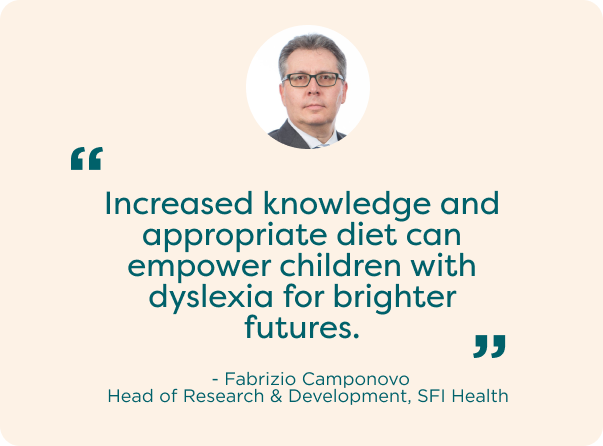
Exploring Dyslexia: exclusive insights from Head of Research & Development, Fabrizio Camponovo
Exploring Dyslexia: exclusive insights from Head of Research & Development, Fabrizio Camponovo

The world of health and well-being is an ever-evolving realm. To stay at the forefront, SFI Health, continuously engages in cutting-edge scientific exploration, enhancing our products to enable healthier lives for everyone.
In this interview, we delve into the journey of one of the driving forces behind SFI Health’s R&D department, Fabrizio Camponovo. With 25 years of expertise in designing, developing, and marketing Nutraceutical and Pharmaceutical products, coupled with a Pharmacy degree from the University of Lausanne and a PhD in Phytochemistry and Pharmacognosy, Fabrizio is a fervent champion of innovation.
What ignited your passion for science?
My passion for science ignited during my primary school days. I was captivated by space and natural sciences, always eager to uncover the “why” behind everything. This curiosity led to summers filled with reading books on physics, chemistry, and space travel, alongside engaging in scientific experiments with friends.
My father played a significant role in nurturing this curiosity, instilling in me a love for innovation and discovery that continues to drive me. At age eighty-nine he was more active than me on social media.
Can you explain what Developmental Dyslexia is?
Certainly. Developmental Dyslexia is a neurodevelopmental disorder characterised by difficulties in reading, writing, and processing sensory information. People with dyslexia struggle to connect visual letters with their corresponding sounds. It’s crucial to understand that dyslexia doesn’t reflect intelligence, but it can significantly impact academic and professional journeys.
Most people are diagnosed with dyslexia as children. The earlier dyslexia is identified, the greater the chances to help the child to manage their challenges and reach their full potential, both in and out of school. There is no medication that can treat dyslexia. Instead, people with dyslexia may benefit by working with a learning specialist who can deliver neuropsychological intervention and offer them strategies for managing their condition.
Why are studies on Dyslexia so important?
Studies from the International Dyslexia Association show that dyslexia affects approximately 5-10% of the population and is responsible for 80% of all learning difficulties.
Unfortunately, dyslexia often goes unnoticed, leading to challenges in education and later in professional life. Kids may feel frustrated and anxious and when they become adults they may also struggle in the workplace. For example, they may experience difficulties with time management, organisation, and following instructions. Early identification is key, as it allows for tailored interventions such as specialised learning support and neuropsychological guidance.
By deepening our understanding of dyslexia through research, we can revolutionise identification, and treatment, and explore supplementary solutions like PUFAs.
What recent insights have emerged from dyslexia research?
Recent research highlights the pivotal role of omega-3 and omega-6 fatty acids in brain function and development. Several studies demonstrate that omega-3 and omega-6 fatty acids are essential nutrients for growth and normal cell function, and they are necessary for the development and maintenance of the normal Central Nervous System (CNS). A deficiency of omega-3 PUFAs may contribute to different neurodevelopmental disorders including ADHD (attention-deficit hyperactivity disorder), autism spectrum disorder, dyslexia and dyspraxia.
Equazen® is indicated to sustain those conditions associated with low fatty acid presence and the activities of its unique Omega-3 and 6 combination has been demonstrated with several clinical studies but no one was specifically designed for people with Developmental Dyslexia like the one we are running now.
Among the hypotheses concerning the aetiology of specific learning disorders and of developmental dyslexia, one of the most accredited is the hypothesis of a deficit related to the magnocellular system which is involved in the extraction of information related to position and movement of the stimuli and responsible for the control of eye movements , and therefore essential for perception and recognition of letters and words when reading and writing.
Several studies have shown that the magnocellular system is sensitive to the contribution of fatty acids through nutrition. Subjects with magnocellular deficits would improve their performance following increase in their daily intake of polyunsaturated fatty acids (PUFA) present in fish oils and in some vegetable oils.
Could you please tell us about your current research efforts?
Absolutely. We’re excited to be collaborating with the renowned IRCCS Eugenio Medea Institute in Italy, which is specialized in neurological and neurodevelopmental disorders in children. The study we are running with them is one of the first studies to investigate these hypotheses in a very rigorous and systematic way. The primary objective of the study is to investigate whether supplementation with PUFA delivered with our Equazen® capsules can increase the effectiveness of neuropsychological intervention for Developmental Dyslexia (DD).
In addition, the study will allow us to investigate many other important hypotheses like the correlation between PUFA levels in the blood and reading/writing performance, the different ratio of omega-3 / omega 6 between children with Developmental Dyslexia (DD) and with Typical development (TD) and to evaluate if the supplementation with PUFA can produce beneficial effects on Magnocellular functions that are not immediately transferred to reading and writing performance.
The results of this study will improve our understanding of the activities of PUFAs and will allow clinicians to optimise their protocols and improve the effectiveness of intervention with an appropriate PUFA supplementation.
How does this build on Equazen®’s existing research?
SFI Health’s recent exploration of free fatty acids’ impact on brain function laid the groundwork for investigating Equazen®’s efficacy in neurodevelopmental disorders like dyslexia. We investigated the link between neurodevelopmental disorders and an imbalance or deficiency in fatty acids as well as the efficacy of the PUFAs supplementation in ADHD and autism spectrum disorders. As a logical continuation of our research, we now aim to investigate the efficacy of the supplementation with our Equazen® products on other neurodevelopment disorders like dyslexia.
What outcomes do you aim to achieve for children with Dyslexia?
We want to increase the knowledge about this neurodevelopmental disorder to be able to identify and recognize its symptoms as soon as possible and treat them with neuropsychological intervention but also with an appropriate diet or with natural products such as PUFAs that may support and increase the effects of neuropsychological treatments. This combined approach can empower children with dyslexia for brighter futures.

How does natural health contribute to supporting individuals with Neurodiversity?
There is currently no specific cure for the causes of Neurodevelopmental Disorders, but there are several effective therapeutic strategies that help manage and live with the symptoms.
Medications are sometimes prescribed to reduce hyperactivity, agitation, anxiety, inattentiveness, etc. and they normally consist of stimulants, antidepressants, or other pharmaceuticals indicated to enhance cognition. Medication, however, should not be the first choice because of the possible side effects. The first choice should be the use of psychosocial therapies or other strategies like lifestyle and nutritional modification or herbal supplements which offer alternative or complementary strategies for managing symptoms and promoting overall well-being.
A holistic approach that combines various strategies may yield the best outcomes.
It is well known now that deficiency of some essential nutrients or some vitamins, and minerals, such as pyridoxine, magnesium, calcium, folic acid, potassium, iron, cholecalciferol, tocopherols, and zinc may be potential risk factors for some NDV and PUFAs appear critical to brain development and neuroplasticity regulation. On the other hand, changes in the gut microbiome and gastrointestinal diseases may impair the digestion of dietary supplements and reduce the absorption of vitamins and minerals.
Speaking of microbiome, it is now well known that a disruption of the gut -brain axis will influence the brain development as well as the neuroplasticity and neuroimmune activities. Gut-brain disruption is frequently observed in individual with NDV disorders and gut microbiota has recently emerged as a potential target for the treatment of neurodevelopmental disorders. According to the latest investigations, several lactobacillus strains, including L. Paracasei, L. Planetarium, L. reuteri, and Bifidobacterium longum, have been effective in treating children’s neurodevelopmental disorders such as ASD and ADHD.
Recently, a large variety of natural plant‐based products with therapeutic possibilities to effectively reduce clinical manifestations with fewer side effects has been investigate. The focus was given on herbal extracts or natural products which could control the release of pro‐inflammatory cytokines (cause of neuronal inflammation), can reduce the levels of oxidative stress (cause of mitochondrial dysfunction) and improve the neurotransmission.
Between the most investigated ingredient we can mention luteoline, cannabinoids, curcuminoids, Bacopa monnieri, Ginkgo biloba, green tea and saffron.
SFI Health is always looking for innovative solutions to help people with NDV, and is following and supporting the research on these and other natural ingredients for the development of new Equazen® line extensions.




